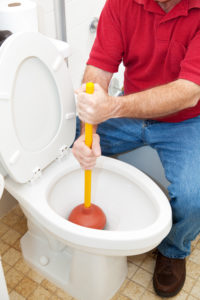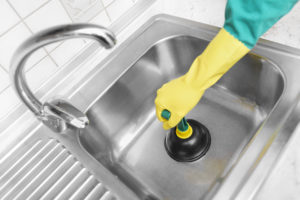
While there are many products and internet ideas out there, not all are good ideas. In general, drain opening chemicals should not be used. There are often easier and less corrosive methods. The good chemicals should be left to a plumbing professional to administer. Just a plain old plunger is still a great tool!
Preventing is what we strive for! We don’t want your household plumbing to cause you a 911. First, think about what you are putting down the particular drain. If it isn’t biodegradable, like wipes and feminine products, don’t put them down the drain. Not only are they very fibrous and able to catch on rough spots in the piping, normal sewage pumps will clog from them. They do not break down, and eventually are filtered out at a sewage treatment plant and landfilled, if they make it all the way to the treatment plants.

Food wastes, especially grease, should not be put down the drain. As grease cools, it becomes very sticky to pipes and other grease build-ups. A
garbage disposal should not be used as a chipper.
True story: Plastic flowers should not be put in a garbage disposal, something about the wire in them.
Tub or shower drain screen covers do a good job catching hair. Tub drain linkages also do a great job catching hair and then clogging up the drain. You are better off cleaning the drain screen than having to take apart the tub drain linkage
. True story: I showed my kids how to take apart their tub drain to clean it – they became much better about cleaning the screen to prevent themselves from having to take apart the drain to clean it.
While it may be impossible to prevent all clogs, they are really only a symptom of some other issue. It could be bad piping, too much going down at once, or a build up in the line has reached a point of no longer being able to provide normal use. Sometimes, more water is better to help rinse out the drain line.
 While there are many products and internet ideas out there, not all are good ideas. In general, drain opening chemicals should not be used. There are often easier and less corrosive methods. The good chemicals should be left to a plumbing professional to administer. Just a plain old plunger is still a great tool!
Preventing is what we strive for! We don’t want your household plumbing to cause you a 911. First, think about what you are putting down the particular drain. If it isn’t biodegradable, like wipes and feminine products, don’t put them down the drain. Not only are they very fibrous and able to catch on rough spots in the piping, normal sewage pumps will clog from them. They do not break down, and eventually are filtered out at a sewage treatment plant and landfilled, if they make it all the way to the treatment plants.
While there are many products and internet ideas out there, not all are good ideas. In general, drain opening chemicals should not be used. There are often easier and less corrosive methods. The good chemicals should be left to a plumbing professional to administer. Just a plain old plunger is still a great tool!
Preventing is what we strive for! We don’t want your household plumbing to cause you a 911. First, think about what you are putting down the particular drain. If it isn’t biodegradable, like wipes and feminine products, don’t put them down the drain. Not only are they very fibrous and able to catch on rough spots in the piping, normal sewage pumps will clog from them. They do not break down, and eventually are filtered out at a sewage treatment plant and landfilled, if they make it all the way to the treatment plants.
 Food wastes, especially grease, should not be put down the drain. As grease cools, it becomes very sticky to pipes and other grease build-ups. A garbage disposal should not be used as a chipper. True story: Plastic flowers should not be put in a garbage disposal, something about the wire in them.
Tub or shower drain screen covers do a good job catching hair. Tub drain linkages also do a great job catching hair and then clogging up the drain. You are better off cleaning the drain screen than having to take apart the tub drain linkage. True story: I showed my kids how to take apart their tub drain to clean it – they became much better about cleaning the screen to prevent themselves from having to take apart the drain to clean it.
While it may be impossible to prevent all clogs, they are really only a symptom of some other issue. It could be bad piping, too much going down at once, or a build up in the line has reached a point of no longer being able to provide normal use. Sometimes, more water is better to help rinse out the drain line.
Food wastes, especially grease, should not be put down the drain. As grease cools, it becomes very sticky to pipes and other grease build-ups. A garbage disposal should not be used as a chipper. True story: Plastic flowers should not be put in a garbage disposal, something about the wire in them.
Tub or shower drain screen covers do a good job catching hair. Tub drain linkages also do a great job catching hair and then clogging up the drain. You are better off cleaning the drain screen than having to take apart the tub drain linkage. True story: I showed my kids how to take apart their tub drain to clean it – they became much better about cleaning the screen to prevent themselves from having to take apart the drain to clean it.
While it may be impossible to prevent all clogs, they are really only a symptom of some other issue. It could be bad piping, too much going down at once, or a build up in the line has reached a point of no longer being able to provide normal use. Sometimes, more water is better to help rinse out the drain line.